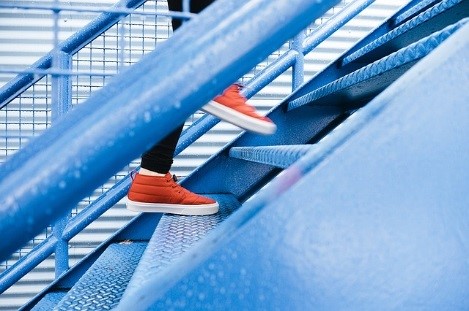
In her book, No Sweat: How the Simple Science of Motivation Can Bring You a Lifetime of Fitness, Michelle Segar encourages us to find “opportunities to move,” or OTMs for short. Finding OTMs means finding ways to do some additional physical movement throughout the day.1
The reasoning behind this is that we live very sedentary lives and being sedentary is bad for both our physical2 and mental health.3 Even if you exercise regularly, you might still be sedentary overall.2 If you put in a 40-minute workout in the morning and then spend the rest of your day sitting at a desk, you’re living a sedentary lifestyle. The solution? Find opportunities to move.
Opportunities to Move
These can be opportunities to exercise, but also moments when you choose to stand, walk, stretch, or simply move your body in some way. Sometimes an OTM is a chance to move when we would otherwise not, such as walking somewhere rather than driving. Sometimes an OTM is an opportunity to move more when we would otherwise move less, such as parking further away from the entrance to the grocery store.
These range from the big to the small. An example of a big OTM would be biking to work rather than driving – obviously not an option for everyone. Mostly, we want to be on the lookout for smaller OTMs. Small OTMs include walking to your colleague’s desk to talk rather than sending an email, taking the stairs rather than the elevator, or, if you do take the elevator, doing a little bit of body movement while you’re in it: shoulder circles, calf raises, and the like.
Here are some other ideas:
- Going to order lunch or drive to lunch? Is there a restaurant within walking distance you could stroll over to instead?
- Can you squeeze in a yoga pose while you’re waiting for the microwave to finish?
- Can you make that phone call while pacing around the room or taking a walk outside?
- Can you do a few lunges while you brush your teeth?
- Can you dance while you’re cooking? (This makes cooking way more fun, by the way)
- How about a rule where every time you send a text you have to stand up?
- Perhaps you could do a little stretching while you’re watching TV?
For ideas to squeeze in bits of exercise at the office, check out this quick video.
Now, you might be thinking, Will doing a 3-minute workout at my desk make me look weird?
Yes. But it will also make you healthier, happier, and more effective at work. Your call.
Now I want to expand the OTMs program beyond movement. The M could also stand for ‘meditate.’
Opportunities to Meditate
You don’t have to go on a weekend retreat or even spend 10 minutes in daily, silent meditation in order to become a meditator. Any amount of meditation is beneficial, and there are numerous opportunities to grab a few minutes here and there throughout the week.
Here are some examples:
- Is a software update forcing you to wait a few minutes while your computer restarts? That’s an OTM.
- Did you arrive five minutes early? Instead of spending five minutes on email or social media, you could make this an opportunity to meditate.
- Or did the person you’re meeting just text you to say they’re running ten minutes late? That’s not an inconvenience; that’s another OTM.
This last one has shifted my response to people being late from one of annoyance to one of gratitude. I’m happy when people are late because it means I get to enjoy an extra bit of psychological rest that I otherwise wouldn’t have made time for. Bonus!
If you don’t meditate at all, this could be how you start, and if you already meditate, this is a way to do more.
Lastly, The M in OTMs could stand for ‘microbreak.’
Opportunities to Microbreak
A microbreak is a moment of rest and recovery carved out of an otherwise busy schedule. The classic microbreak is closing your eyes and taking three deep breaths, which is like a mini-meditation, but there are many forms of microbreak to try. What they all have in common is that they recharge your batteries, giving you more energy to keep working, thinking, and creating.
Here are some examples:
- Switching between tasks? Stop, close your eyes, and take at least one deep breath.
- Feeling a little burnout? Walk over the window and stare at a tree for 30 seconds.
- Starting to have trouble focusing? Throw on some noise-canceling headphones and enjoy a relaxing instrumental song, like this one.
These behaviors might seem pointless, but they can be surprisingly powerful. The modern world has us all overstimulated. We need more moments of rest and recovery in our lives. It’s good to be bored sometimes. Try it and see.
Everything Counts
OTMs are an excellent expression of the principle that everything counts. Every day presents us with many opportunities to make incremental improvements in our physical and mental health, and each step in the right direction is worthwhile. Health is not an event; it’s a lifelong process.
Can you find an opportunity to move more today?
Can you find an opportunity to meditate this week?
Can you find an opportunity to microbreak in the next hour?
I bet you can.
And I’m pretty sure you won’t regret it.
1 Segar, Michelle, Ph.D. No Sweat: How the Simple Science of Motivation Can Bring You a Lifetime of Fitness. Amacon, 2015.
2 Vernikos, Joan, Ph.D. Sitting Kills, Moving Heals: How Everyday Movement Will Prevent Pain, Illness, and Early Death — and Exercise Alone Won’t. Quill Driver Books, 2011.
3 Ratey, John J., MD. Spark: The Revolutionary New Science of Exercise and the Brain. Little, Brown and Company, 2008.
